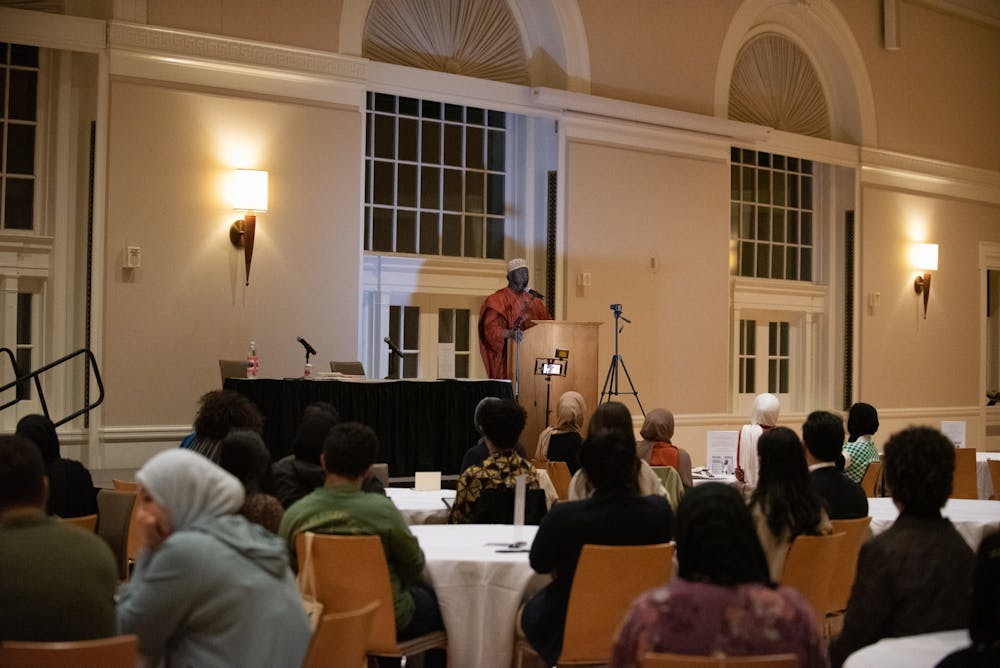The quiet hum of conversation filled the Newcomb Ballroom Monday evening as community members, students and faculty waited for speaker Imam Fode Drame to begin his lecture. Drame, a renown Sufi Muslim scholar and linguist, joined students to speak about what they can learn from an Islamic West African community. The talk emphasized character formation, education and unique traditions to peacefully diffuse Islam in a non-Islamic environment.
The event was hosted in part by Muslims United, a group on Grounds dedicated to creating an inclusive space for Muslims and non Muslims of different backgrounds to learn from each other and explore their faith and spirituality further.
Rofiat Abubakar, event coordinator and fourth-year College student, felt that the event would highlight the perspective of Islam from West Africa in constrast to the American view of her faith she has witnessed growing up. Abubakar said hosting Drame helped to promote the message of inclusivity of Muslims United.
“We want to make it an inclusive space so no matter what race you are, your sexuality or what sect of Islam you’re in, you have a space to advocate and take part in activism,” Abubakar said. “This event will really shine light on [the West African] perspective.”
Drame was invited to speak by Muslims United, the Department of Religious Studies, the Islamic Studies Colloquium and the Carter G. Woodson Institute through funding from the Virginia Center for the Study of Religion and the Woodson Institute.
Marjan Naderi, event coordinator and third-year College student, said it is important to educate others about the Islamic faith to promote mutual understanding and respect.
“Being able to come close to the most misunderstood religion in the world is critical for the development of a complete citizen,” Naderi said. “When people are able to have these opportunities to have their stereotypes and their preconceived notions challenged, not only makes the United States safer for Muslims, for Africans, but also opens a completely new branch of support.”
Born and raised in Senegambia, Drame learned the foundations of Islam under the Jahanke tradition of West Africa. He then moved to Montreal, Canada where he attended university for linguistics, with a special focus on Egyptian hieroglyphics. Since then, Drame has regularly produced globally-streamed lectures, founded a non-profit organization — the Zawiyah Foundation — and written close to 20 books translating and about the Quran.
“I think that the type of tradition that I was raised in … is a wonderful model that the world … needs to know,” Drame said. “This model is an example of Islam that was able to grow in an environment that was not Islamic.”
Drame later spoke about the Jahanke tribe in West Africa as a model for the peaceful propogation of Islam across the world.
“I’m presenting a model of an Islamic community that is responsible for the spread of a partiular type of Islam which espouses peace throughout their missionary work,” Drame said. “I think in the present state of the world where we have a lot of tension, it’s good for people to know that there are other ways of spreading Islam that are peaceful.”
Oludamini Ogunnaike, associate professor of Religious Studies said Drame’s examination of the Jahanke tradition is particularly notable given the contemporary context of globalization and the lasting impacts of imperialism on Islam. Ogunnaike believes that providing a platform for non-Western traditions is necessary.
“A lot of the traditions like the one Imam comes from have been completely wiped out by colonization,” Ogunnaike said. “And so all of the people who would have been trained like Imam did, were forced to go to Western schools … There's a lot of talk about what decolonizing universities would look like, and I think having speakers with Imam’s training acknowledging there are these other intellectual traditions … and platforming them, interacting with them in a respectful way, learning from them, is really important.”
Ogunnaike also highlighted the Jahanke tribe’s success in fostering relationships between Muslim and non-Muslims as a proccess to learn from.
“The system that Imam is coming from, this particular Jahanke tradition, is one that, for a long time, has served to maintain very peaceful relationships between Muslims and non-Muslims in West Africa,” Ogunnaike said. “It's had incredibly positive social impacts and outcomes. And I think it has lessons that we can learn from today.”
Assoc. Religious Studies Prof. Shankar Nair noted that Drame’s teachings on character formation is also an idea the modern day university can adapt to its tradition of teaching the humanities.
“The tradition that Imam comes from, that curriculum is about character formation, a training of a human being in all sorts of ways that go beyond quote-unquote practicality,” Nair said. “There's a kind of training, a kind of ethical moral formation, a kind of social formation, even a kind of way of training the body, top to bottom. I think there's a lot to learn from.”
During the lecture, Drame also discussed the unique methods of the Jahanke tradition that allowed for their peaceful spread of Islam.
“They impart what they call a secret knowledge to [the students] and once they’re done with the training, they are now equipped to be a leader of their community,” Drame said. “They’ve developed a way that is a bit more open and free — it’s not structured into a form of an order.”







